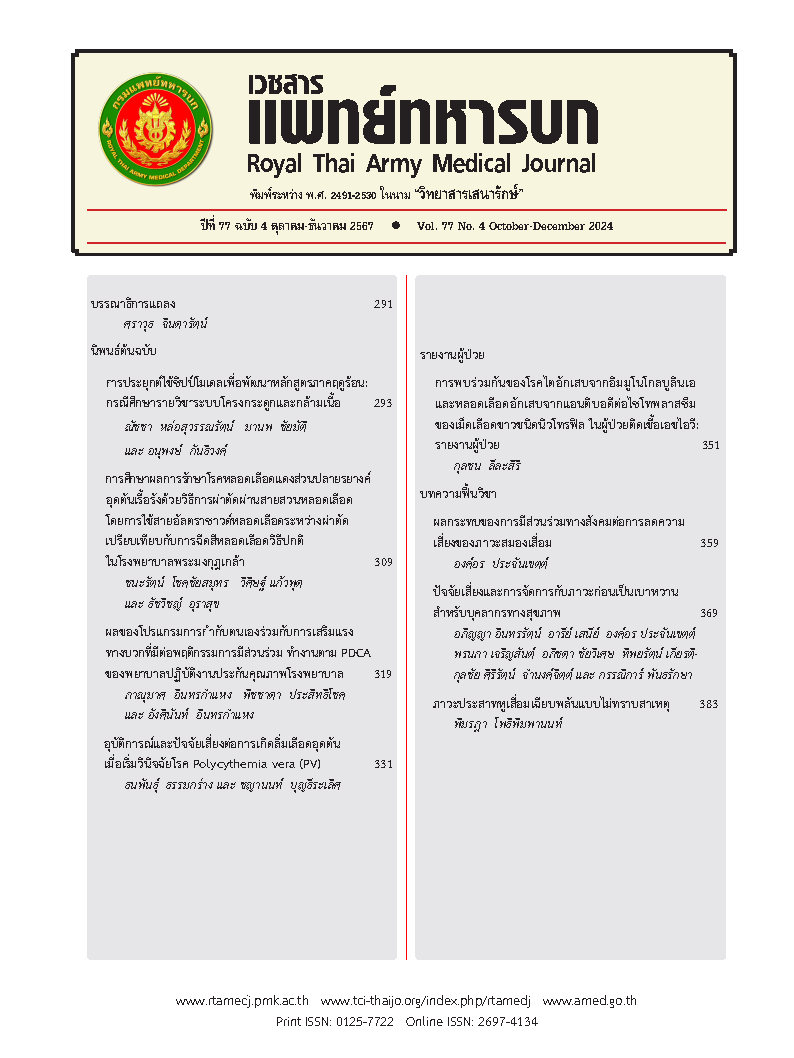ผลกระทบของการมีส่วนร่วมทางสังคมต่อการลดความเสี่ยงของภาวะสมองเสื่อม
Main Article Content
บทคัดย่อ
ภาวะสมองเสื่อม เป็นภาวะความเสื่อมถอยทางความจำ การรู้คิดบกพร่อง และปัญหาด้านพฤติกรรม อารมณ์และจิตใจอย่างต่อเนื่อง ซึ่งเป็นปัญหาสุขภาพระดับโลกที่สำคัญและมีจำนวนผู้ป่วยเพิ่มขึ้นอย่างต่อเนื่อง เนื่องจากทั่วโลกมีประชากรสูงวัยมีจำนวนเพิ่มมากขึ้น ในขณะที่ปัจจัยเสี่ยงบางอย่าง เช่น อายุและพันธุกรรม ไม่สามารถปรับเปลี่ยนได้ แต่ยังมีอีกหลายปัจจัยที่สามารถปรับเปลี่ยนเพื่อลดความเสี่ยงของการเกิดภาวะสมองเสื่อมได้รวมถึงปัจจัยด้านการมีส่วนร่วมทางสังคม ซึ่งมีความสำคัญอย่างมากในแง่ของการป้องกันการเสื่อมถอยด้านการรู้คิด บทความนี้มีวัตถุประสงค์เพื่ออธิบายความสัมพันธ์ของการมีส่วนร่วมทางสังคม กับการลดความเสี่ยงของการเกิดภาวะสมองเสื่อม และบทบาทสำคัญของบุคลากรทางสุขภาพในการส่งเสริมการมีส่วนร่วมทางสังคม โดยการเสนอแนวทางที่สำคัญ และการสนับสนุนกิจกรรมในชุมชนที่ตอบสนองความต้องการของประชาชน อันจะนำไปสู่การพัฒนารูปแบบการดูแลประชาชนในชุมชนที่มีประสิทธิภาพ เพื่อลดความเสี่ยงของการเกิดภาวะสมองเสื่อมและการส่งเสริมสุขภาวะด้านการรู้คิด
Downloads
Article Details

อนุญาตภายใต้เงื่อนไข Creative Commons Attribution-NonCommercial-NoDerivatives 4.0 International License.
บทความในวารสารนี้อยู่ภายใต้ลิขสิทธิ์ของ กรมแพทย์ทหารบก และเผยแพร่ภายใต้สัญญาอนุญาต Creative Commons Attribution-NonCommercial-NoDerivatives 4.0 International (CC BY-NC-ND 4.0)
ท่านสามารถอ่านและใช้งานเพื่อวัตถุประสงค์ทางการศึกษา และทางวิชาการ เช่น การสอน การวิจัย หรือการอ้างอิง โดยต้องให้เครดิตอย่างเหมาะสมแก่ผู้เขียนและวารสาร
ห้ามใช้หรือแก้ไขบทความโดยไม่ได้รับอนุญาต
ข้อความที่ปรากฏในบทความเป็นความคิดเห็นของผู้เขียนเท่านั้น
ผู้เขียนเป็นผู้รับผิดชอบต่อเนื้อหาและความถูกต้องของบทความของตนอย่างเต็มที่
การนำบทความไปเผยแพร่ซ้ำในรูปแบบสาธารณะอื่นใด ต้องได้รับอนุญาตจากวารสาร
เอกสารอ้างอิง
Patterson, C. World Alzheimer Report 2018-The State of the Art of Dementia Research: New Frontiers. London, UK : Alzheimer’s Disease International;2018. 1-48.
Samtani S, Mahalingam G, Lam BCP, Lipnicki DM, Lima-Costa MF, Blay SL, et al. Associations between social connections and cognition: a global collaborative ndividual participant data meta-analysis. Lancet Healthy Longev. 2022;3(11):e740-e753.
Anatürk M, Patel R, Ebmeier KP, Georgiopoulos G, Newby D, Topiwala A, et al. Development and validation of a dementia risk score in the UK Biobank and Whitehall II cohorts. BMJ Ment Health. 2023;26(1): e300719.
Huber M, Knottnerus JA, Green L, van der Horst H, Jadad AR, Kromhout D, et al. How should we define health?. BMJ. 2011;343:d4163.
Dröes RM, Chattat R, Diaz A, Gove D, Graff M, Murphy K, et al. Social health and dementia: a European consensus on the operationalization of the concept and directions for research and practice. Aging Ment Health. 2017;21(1):4-17.
Livingston G, Huntley J, Sommerlad A, Ames D, Ballard C, Banerjee S, et al. Dementia prevention, intervention, and care: 2020 report of the Lancet Commission. Lancet. 2020; 396(10248):413-46.
Sommerlad A, Marston L, Huntley J, Livingston G, Lewis G, Steptoe A, et al. Social relationships and depression during the COVID-19 lockdown: longitudinal analysis of the COVID-19 Social Study. Psychol Med. 2021;13:1-10.
Suárez-González A, Rajagopalan J, Livingston G, Alladi S. The effect of COVID-19 isolation measures on the cognition and mental health of people living with dementia: A rapid systematic review of one year of quantitative evidence. EClinicalMedicine. 2021;39:101047.
Levasseur M, Lussier-Therrien M, Biron ML, Raymond É, Castonguay J, Naud D, et al. Scoping study of definitions of social participation: update and co-construction of an interdisciplinary consensual definition. Age Ageing. ;51(2):afab215.
Sommerlad A, Kivimäki M, Larson EB, Röhr S, Shirai K, Singh-Manoux A, et al. Social participation and risk of developing dementia. Nat Aging. 2023;3(5):532-45.
Mahalingam G, Samtani S, Lam BCP, Lipnicki DM, Lima-Costa MF, Blay SL, et al. Social connections and risk of incident mild cognitive impairment, dementia, and mortality in 13 longitudinal cohort studies of ageing. Alzheimers Dement. 2023;19(11):5114-28.
Christakis NA, Fowler JH. Social contagion theory: examining dynamic social networks and human behavior. Stat Med. 2013;32(4):556-77.
Craddock E, vanDellen MR, Novak SA, Ranby KW. Influence in relationships: a metaanalysis on health-related social control. Basic Appl Soc Psychol. 2015;37(2):118-30.
Scarmeas N, Levy G, Tang MX, Manly J, Stern Y. Influence of leisure activity on the incidence of Alzheimer’s disease. Neurology. 2001;57(12):2236-42.
Blazer D. Social isolation and loneliness in older adults—A mental health/Public health challenge. JAMA Psychiatry. 2020;77(10):990-1.
Smith L, Bloska J, Jacob L, Barnett Y, Butler L, Trott M, et al. Is loneliness associated with mild cognitive impairment in low- and middle-income countries? Int J GeriatrPsychiatry. 2021;36(9):1345-53.
Desai R, John A, Stott J, Charlesworth G. Living alone and risk of dementia: a systematic review and meta-analysis. Ageing Res Rev. 2020;62:101122.
Kuiper JS, Zuidersma M, Oude Voshaar RC, Zuidema SU, van den Heuvel ER, Stolk RP, et al. Social relationships and risk of dementia: a systematic review and meta-analysis of longitudinal cohort studies. Ageing Res Rev. 2015;22:39-57.
Holt-Lunstad J, Smith TB, Layton JB. Social relationships and mortality risk: a metaanalytic review. PLoS Med. 2010;7(7):e1000316.
.Pantaewan P, Intharatana A, Prajankett O. [Nurses and health behavior modification: concepts, theories and applications] Bangkok: Raknganpim 2017 Publishing; 2023.
Kankarn W, Wirunphan B, Arthiwet W, Thajai S. Participatory Development of Model Communities to Support the Aging Society in the Isan Context. J Royal Thai Army Nurses [Internet]. 2023 May 5 [cited 2024 Aug. 7];24(1):492-501. Available from: https://he01.tci-thaijo.org/index.php/JRTAN/article/view/260697
Camozzato A, Godinho C, Varela J, Kohler C, Rinaldi J, Chaves ML. The complex role of having confidant on the development of Alzheimer’s disease in a community-based cohort of older people in Brazil. Neuroepidemiology. 2015;44(2):78-82.
Khondoker M, Rafnsson SB, Morris S, Orrell M, Steptoe A. Positive and negative experiences of social support and risk of dementia in later life: An investigation using the English Longitudinal Study of Ageing. J Alzheimers Dis. 2017;58(1):99-108.
Htun HL, Teshale AB, Owen AJ, Ryan J, Woods RL, Orchard SG, et al. Social activities and risk of dementia in community-dwelling older people: gender-specific findings from a prospective cohort study. J Gerontol B Psychol Sci Soc Sci. 2024;79(5):gbae050.
Mabire JB, Gay MC, Charras K, Vernooij-Dassen M. Impact of a psychosocial intervention on social interactions between people with dementia: An observational study in a nursing home. Activities, Adaptation & Aging. 2022;46(1):73-89.


